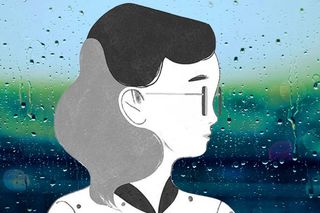
Is a Loneliness Minister Really Necessary? Yes, Actually.
Aristotle may well have had an eye on the future when he called man a “social animal,” and elaborated that a man living without common societal bonds is, “either a beast or a god.” I would imagine today’s technolog...

Aristotle may well have had an eye on the future when he called man a “social animal,” and elaborated that a man living without common societal bonds is, “either a beast or a god.” I would imagine today’s technological capabilities would make us look a lot like gods, compared to the men and women of ancient Greece. As would the reports suggesting that, for all our digital enhancements, there has never been a better time to be lonely; our century is one of increasing isolations brought on, ironically enough, by the web’s ability to feed us “a day of happy touch points,” as David Brooks put it in a 2016 New York Times op-ed.
Fast forward two years (or two millennia), to the UK government’s appointment, this week, of a Minister for Loneliness. When British Prime Minister Theresa May addressed the issue saying, “for far too many people, loneliness is the sad reality of modern life,” she wasn’t overstating matters, nor was she exposing the warm beating heart of the government — she became the first national leader to recognize chronic loneliness as a public health and economic crisis that drains health care systems and dampens national productivity. A government intervention to set up better institutions and processes for people to get together and socialize may not be a fix-all, but it’s a healthy start – literally and figuratively.
“The most common pathology I saw was not heart disease or diabetes; it was loneliness…” writes Vivek Murthy, a former Surgeon General of the US, in a Harvard Business Review essay on the “loneliness epidemic” that he observed during his many years caring for patients. “I found that loneliness was often in the background of clinical illness, contributing to disease and making it harder for patients to cope and heal…. Loneliness is also associated with a greater risk of cardiovascular disease, dementia, depression, and anxiety….”
Research by John Cacioppo, director of the University of Chicago’s Center for Cognitive and Social Neuroscience, backs up Murthy’s anecdotal evidence. Cacioppo reverses the focus of modern medicine and psychology by concentrating on the individual in his or her social context, rather than as an independent unit. His findings, based on brain scans, blood pressure, and immune function, reveal that loneliness is strong enough to alter DNA replication. In Loneliness: Human Nature and the Need for Social Connection he writes about how “chronic loneliness,” disrupts perceptions, behavior, and physiology, to become a self-affirming trap that can, in many scenarios, even alter life expectancy. It’s a grim prognosis. “Social isolation has an impact on health comparable to the effect of high blood pressure, lack of exercise, obesity, or smoking … Loneliness not only alters behavior but shows up in measurements of stress hormones, immune function, and cardiovascular function. Over time, these changes in physiology are compounded in ways that may be hastening millions of people to an early grave.”
Closer to home, demographics in India suggest we’ll soon see these effects among the elderly (if we’re not already). This demographic is always at higher risk of being left behind by a fast-evolving technological world; here, it’s compounded by the fact that few people plan either socially and financially for retirement, making the elderly economically dependent on young people who must migrate away in search of work that will support them all. A study by Agewell Foundation, a Delhi-based NGO, concludes that, in a nation of over a billion people, one in every two elderly individuals suffers the effects of loneliness – and the figure in urban neighbourhoods is twice as high.
Yet, the issue isn’t confined to the elderly. An India Today article, tellingly titled “After stress, urban India’s newest bane is loneliness,” suggests that, as jobs open up with BPO’s in retail, media, hospitality and other sectors, young people are experiencing displacement and are unable to adjust to lengthening working hours. Quoted there is Delhi-based psychiatrist Dr Sanjay Chugh, saying he has seen, in his practice, the number of cases related to loneliness and its related disorders double in the last three years.
As with so many things, the question of loneliness is also subjective and relative, according to researchers like Cacioppo. Which is too say that the culprit behind these ‘dire statistics,’ is not usually being alone, but the subjective experience of loneliness – which means it may not always be obvious. Disguised loneliness is equally deadly, and there is no dearth of examples amongst celebrities very much in the public eye, like Princess Diana, Marilyn Monroe, or Marlon Brando. In fact, 60s blues icon Janis Joplin, whose electric, on-stage performances were an ironic contrast to the isolations of her personal life, captured the subjective experience of loneliness in the title of a song she was working on shortly before her death from drug abuse at 27: “I just made love to twenty-five thousand people, but I’m going home alone.” (Several decades later, another 27-year-old blues star would die of the same cocktail of drugs and loneliness, resulting in a documentary on her life that feels like an extended cry for help.)
There’s a poignant African proverb that opens Cacioppo’s book. It goes, “If you want to go fast, go alone. If you want to go far, go together.” He reasons, “When people are asked what pleasures contribute most to happiness, the overwhelming majority rate love, intimacy and social affiliation above wealth or fame, even above physical health.”
We don’t need to rely on the decades of research to affirm the positives of living a socially connected life, we have only to contemplate the end: three of the five top regrets of the dying, that nurse Bronnie Ware has come across in a lifetime of palliative care, have to do with people not being able to grow relationships with their friends and loved ones.
Accepting that feeling alone is an experience of pain is the first step in tackling it. An initiative like the UK’s Ministry for Loneliness might sound almost whimsical. But it might also be what we need to ward off the challenges of living in a global village that lets us go fast, but not far. It is time to re-learn how to go together.
Karishma Attari is a Mumbai-based writer, book reviewer and sunshine generator. She is the author of I See You and Don’t Look Down and runs a workshop series titled 'Shakespeare for Dummies.'
Related


New Study Compares Risks of C‑sections, Vaginal Deliveries
